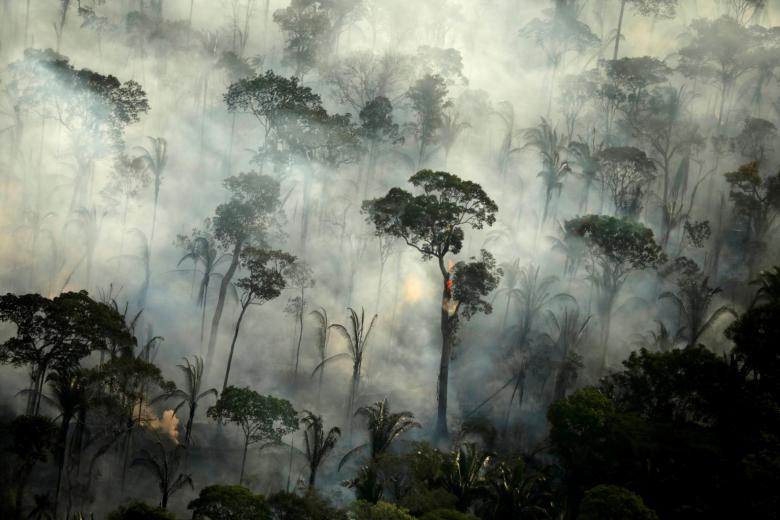The Covid-19 pandemic has understandably superseded the issue that dominated the news, politics, business and academia for much of last year - the climate emergency.
But do they both have the same underlying causes and can the solutions be the same?
The coronavirus is believed to have originated at wildlife markets in Wuhan, China, and was transmitted to humans as a result of the proximity between wildlife and people.
Major landscape changes are causing animals to lose habitats, which means species are crowded together and are coming into greater contact with humans.
The characteristics of our complex, connected modern way of life enhance the effects of disease occurrence. Thus, the spread of the disease can be rapid as in the case of Covid-19, initially because of the overcrowding, and then by travel.
Disease outbreaks become epidemics, which can quickly become pandemics. There is often an understandable reluctance to take the emergency measures needed to contain the disease because of the economic and social consequences of disruption to day-to-day life.
All these aspects of human activity are the same as those underlying the climate emergency.
Indeed, is Covid-19 yet another symptom of the unsustainability of modern human civilisation?
While human health research considers these wider social factors, it seldom considers the effect of the surrounding natural ecosystems.
The biosphere we inhabit is a vast interconnected array of species of microbes, plants and animals coexisting in dynamic but stable ecosystems. There have always been viruses. As they get better at infecting human cells, the cell's defence mechanisms become stronger.
For millennia, the forces of nature kept everything in balance, with death by viral disease playing a part, affecting all species, plants and animals, including humans.
But in the 20th and 21st centuries, things have changed dramatically. Earth's ecosystems have been subject to unprecedented levels of global change stemming from human activities, a period referred to as the Great Acceleration, including climate change, land use intensification, atmospheric pollution, and species extinctions and invasions.
The human population grew rapidly to 1.6 billion by 1900 and to six billion by the end of the 20th century, in part because of the ability to prevent and treat emerging diseases. Pressure on the environment continued to grow and the consequences of human-induced global change on the Earth's ecosystems intensified.
There is now a continuous race to find new treatments and vaccines to keep up, and when a totally new, highly contagious virus appears, such as Covid-19, we fall short, with tragic consequences.
So what can we do about this?
Short-term efforts are obviously focused on containing the spread of the pandemic and the search for treatments and a vaccine.
In the longer term, given that new infectious diseases will likely continue to spread rapidly into and within cities, we need to change the way we live.
The way mankind views its place on planet Earth is the cause of the many environmental crises - and of the reluctance to take meaningful and urgent action to deal with them.
This view gives humans the right to exploit everything for their own benefit regardless of the consequences, and the unhealthy planet that results from it.
But I believe we should learn to live in harmony with life on Earth by respecting the land, the oceans and the atmosphere.
We can use knowledge, creativity and innovation to drive transformation in all sectors of society.
This should be based on evidence derived from research.
We need to harness new technologies, not only in medicine, but also to enable sustainable transport, energy provision and food production.
We need reform in our education systems and to embed these new ideas throughout society. New government policies need to incentivise these changes and instil these principles in commerce and industry.
In this sustainable way of life, we might be able to not only reduce the incidence of new animal-borne diseases but also have a more resilient global economic, public health and social structure.
The drivers and pressures leading to an unhealthy planet must be addressed. We must realise that healthy people, a healthy planet and a healthy economy can be mutually supportive.
An overhaul of approaches to urban planning and development is needed. Sustainable mobility can increase labour productivity, reduce the need for land for agriculture and cut the costs associated with urban congestion and transport-related pollution.
I would promote gender equality, including the right to inherit and own land, then food security, and many health issues that relate especially to women and children could be better addressed.
Change must come in both rich and poor societies and in all countries, in a spirit of international collaboration and cooperation.
The only way environmental catastrophe can be avoided is by a profound change in our goals, motivations and ambitions such that we recognise our place in nature as one species among millions and act accordingly.
The coronavirus is having a horrendous impact on our world but our response can demonstrate just how far we have come as a civilisation.
When we finally emerge from the pandemic, the world has an opportunity to transform itself to have a truly sustainable future, and to create a fairer, healthier and happier way of life for all.
- Professor Benjamin Horton is the chair of the Asian School of the Environment at Nanyang Technological University and a principal investigator at the Earth Observatory of Singapore. He is an author of the Intergovernmental Panel on Climate Change Fifth Assessment Report and an editor of the Sixth Assessment Report.











